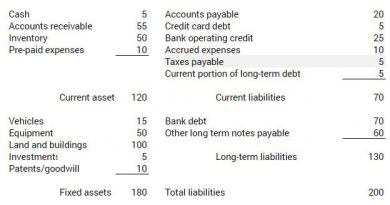Understanding Earned Income and the Earned Income Tax Credit

Contents
- 1 Understanding Earned Income and the Earned Income Tax Credit
- 1.1 What Is Earned Income?
- 1.2 Understanding Earned Income
- 1.3 Tax Considerations
- 1.4 Types of Earned Income
- 1.5 Earned Income Tax Credit (EITC)
- 1.6 Qualification for the Earned Income Tax Credit
- 1.7 Example of Earned Income
- 1.8 What Are Some Examples of Unearned Income?
- 1.9 How Do I Know If I Have Earned Income?
- 1.10 What Is the Difference Between Earned and Unearned Income?
- 1.11 The Bottom Line
Understanding Earned Income and the Earned Income Tax Credit
Lea Uradu, J.D. is a Maryland State Registered Tax Preparer, State Certified Notary Public, Certified VITA Tax Preparer, IRS Annual Filing Season Program Participant, and Tax Writer.
What Is Earned Income?
Earned income is money received for work performed, such as wages, salaries, bonuses, commissions, tips, and net earnings from self-employment. It can also include long-term disability, union strike benefits, and payments from certain deferred retirement compensation arrangements.
Earned income can be contrasted with unearned income, also known as passive income, which is money not acquired through working.
Key Takeaways
- Earned income is any income received from a job or self-employment.
- Earned income may include wages, salary, tips, bonuses, and commissions.
- Income derived from investments and government benefit programs would not be considered earned income.
- Earned income is taxed differently from unearned income.
- Employed taxpayers with lower incomes may be eligible for an earned income tax credit (EITC).
Understanding Earned Income
For tax purposes, earned income is any income you receive for work you have done for an employer or a business of your own.
Examples of income that isn’t considered earned include government benefits, such as payments from the Temporary Assistance for Needy Families program, unemployment, workers’ compensation, and Social Security.
Also excluded are disbursements from non-deferred pensions and retirement plans, alimony, capital gains, interest income from a bank account, stock dividends, bond interest, passive income generated from rental property, and salaries paid to inmates who work in a penal institution.
Both earned and other types of income are generally taxable, although sometimes at different percentage rates. For example, in the 2023 and 2024 tax years, the federal government taxes earned income at seven separate rates, ranging from 10% to 37%. The thresholds tend to rise yearly to account for inflation and differ for single filers, married couples filing jointly, and heads of households.
Long-term capital gains on assets held for a year or more are taxed at 0%, 15%, and 20%, depending on the amount and your filing status. Short-term capital gains, which have been held for less than a year, are taxed at the same rate as your earned income.
Tax Considerations
Determining whether income is earned or unearned—and reporting it on the appropriate lines of a Form 1040 or other tax return—is relatively straightforward. For some taxpayers, however, other ramifications of earned income are worth considering.
If you are receiving Social Security benefits, for example, you may have to pay income tax on a portion of those benefits if you have earned income (or other income) over a certain threshold. In that case, up to either 50% or 85% of your benefits will be subject to tax, depending on your income and filing status.
This can be an important consideration for people who plan to continue working after they are eligible for Social Security benefits or are deciding whether to delay filing for benefits.
If you are self-employed, you also need to consider how much earned (and other) income you expect to have for the year and pay estimated taxes each quarter based on that amount. If you fail to pay enough tax throughout the year, you’ll have to make it up when you file your tax return, and you also may be subject to Internal Revenue Service (IRS) penalties.
If you receive Social Security benefits, having earned income can affect whether those benefits are taxable.
Types of Earned Income
Taxpayers may collect an array of earned income, and a single taxpayer may collect more than one type of earned income at any given time. Below are examples of types of earned income.
- Salaries/Wages: Salaries or wages are the most common type of earned income. Salaries or wages refer to the amount of money that an individual earns from their employer in exchange for their work.
- Self-Employment Income: Whether you work for yourself or for someone else’s company, both types of income are considered earned. For self-employed individuals, this includes freelancers, consultants, and small business owners.
- Tips and Commissions: Tips or commissions are payments that individuals receive in addition to their regular salary or wages.
- Bonuses: Bonuses are non-guaranteed payments that individuals may receive from their employer for meeting certain performance goals or achieving other milestones.
- Honorarium: Honorariums are payments for services such as speaking at an event, writing an article, or participating in a convention.
- Long-term disability benefits: Long-term disability retirement benefits claimed before reaching the minimum retirement age may qualify as earned income.
Earned Income Tax Credit (EITC)
If you have a relatively low earned income and meet other qualifications, you may be eligible for the federal earned income tax credit (EIC or EITC), a refundable tax credit that can reduce your tax bill or result in a refund. To qualify for the credit, you must file a tax return even if you don’t owe any tax or otherwise wouldn’t be required to file one.
The EITC was conceived as a type of “work bonus plan” to supplement the wages of low-income workers, help offset the effect of Social Security taxes, and encourage work as a way to move people off welfare. It continues to be viewed as an anti-poverty tax benefit aimed at rewarding people for employment.
Qualification for the Earned Income Tax Credit
To qualify for the EITC, you must have worked during the year and earned an income below a certain threshold, depending on your marital status and number of children. You may have investment income, but it must be below a certain amount.
- Have a valid Social Security number by the due date of your tax return (includes extensions)
- Be a U.S. citizen or a resident alien all year
- Not file Form 2555 for Foreign Earned Income
- Meet certain qualifying rules if you are separated from your spouse and not filing a joint tax return
The amount of EITC benefit you can receive depends on your income and the number of dependents you claim.
Example of Earned Income
Imagine a taxpayer who earned a $50,000 salary from their day job, a $10,000 bonus, a $5,000 wage from their side gig, and a $500 tip for that side gig. In addition, that taxpayer earned $1,000 in ordinary dividends and recognized $25,000 in capital gain distributions.
In this example, the taxpayer’s earned income is $65,500. The remaining $26,000 ($1,000 of ordinary dividends and $25,000 of capital gain distributions) are not considered earned income.
What Are Some Examples of Unearned Income?
Unearned income includes interest from savings, certificates of deposit (CDs), or other bank accounts, bond interest, alimony, capital gains, and dividends from stock. Income from retirement accounts, Social Security benefits, inheritances, gifts, welfare payments, rental income, and annuities are all also classified as unearned income.
How Do I Know If I Have Earned Income?
First, determine if you have any type of income at all. Consider avenues in which you received compensation for your time or for selling something.
Then, compare your activity against IRS guidance manuals to determine if that activity is earned or unearned income. If you earned money for a job, it was likely earned income.
What Is the Difference Between Earned and Unearned Income?
Earned income comes from working, while unearned income does not. The IRS may treat each type of income differently for tax purposes. Tax rates vary among sources of unearned income; most unearned income sources are not subject to payroll taxes.
The Bottom Line
Earned income is any income that you receive from a job or self-employment. It can include wages, tips, salary, commissions, or bonuses. It is different from unearned income, which comes from things like investments or government benefits. The two types of income are taxed differently by the IRS.
If you have earned income below a certain threshold, you may qualify for the earned income tax credit. This is a refundable tax credit that can lower your tax bill or result in a tax refund.



